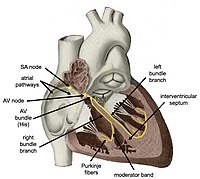Electrical conduction system of the heart

Okay kiddo, listen up! Your heart is like a pump that helps to circulate blood in your body. But have you ever wondered how it works? Well, the heart has a special system called the electrical conduction system that helps it beat in a coordinated way.
Let me tell you more about it: imagine you have a TV remote control and you want to turn on the TV. You press a button, and voila! The TV turns on. Similarly, the heart has a special group of cells that act as tiny powerhouses and generate electrical signals (like buttons in the remote control) that control each heartbeat.
These electrical signals start in a tiny area of the heart called the sinoatrial (SA) node (pronounced "sah-no-AY-tree-ul"), which is located in the upper chamber of the heart (your left and right atria). Think of it like the conductor of an orchestra - it sets the rhythm and tempo! The SA node sends out electrical signals that spread across both atria, causing them to contract (squeeze) and fill the lower chambers (your left and right ventricles) with blood.
After this, the electrical signals pass through another group of cells called the atrioventricular (AV) node, which slows down the electrical impulses, allowing time for the ventricles to fill up with blood. Think of this like a traffic light that stops the cars for a while, so they don't collide!
Then, the electrical signals spread rapidly through the ventricles, causing them to contract and pump blood out of the heart to the rest of the body. This is like the starting gun that sets off a race!
The heart's electrical conduction system helps to coordinate the timing of the heartbeats, making sure that the atria and ventricles work together in a synchronized way. It's pretty amazing, isn't it?
So, there you have it, kiddo. The electrical conduction system of the heart is like a remote control that sends signals to make your heart beat in a coordinated way. Pretty cool, huh?
Let me tell you more about it: imagine you have a TV remote control and you want to turn on the TV. You press a button, and voila! The TV turns on. Similarly, the heart has a special group of cells that act as tiny powerhouses and generate electrical signals (like buttons in the remote control) that control each heartbeat.
These electrical signals start in a tiny area of the heart called the sinoatrial (SA) node (pronounced "sah-no-AY-tree-ul"), which is located in the upper chamber of the heart (your left and right atria). Think of it like the conductor of an orchestra - it sets the rhythm and tempo! The SA node sends out electrical signals that spread across both atria, causing them to contract (squeeze) and fill the lower chambers (your left and right ventricles) with blood.
After this, the electrical signals pass through another group of cells called the atrioventricular (AV) node, which slows down the electrical impulses, allowing time for the ventricles to fill up with blood. Think of this like a traffic light that stops the cars for a while, so they don't collide!
Then, the electrical signals spread rapidly through the ventricles, causing them to contract and pump blood out of the heart to the rest of the body. This is like the starting gun that sets off a race!
The heart's electrical conduction system helps to coordinate the timing of the heartbeats, making sure that the atria and ventricles work together in a synchronized way. It's pretty amazing, isn't it?
So, there you have it, kiddo. The electrical conduction system of the heart is like a remote control that sends signals to make your heart beat in a coordinated way. Pretty cool, huh?
Related topics others have asked about:
